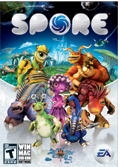 Last week I blogged (Flunking Spore - video game failed by scientists) about Science magazine’s Oct 24 review of the new video game Spore that outlined the problems of looking at the game as a way to learn biology. Not only did multiple scientists give the game poor grades for science content, but a documentary promoting the game misleadingly used interviews with scientists that implied endorsement.
Last week I blogged (Flunking Spore - video game failed by scientists) about Science magazine’s Oct 24 review of the new video game Spore that outlined the problems of looking at the game as a way to learn biology. Not only did multiple scientists give the game poor grades for science content, but a documentary promoting the game misleadingly used interviews with scientists that implied endorsement.
Now, Eric Klopfer and Kurt Squire, co-founders of the Learning Games Network, respected researchers and proponents of games in education, respond to “Flunking Spore.” In two articles (part 1, part 2), they tackle some of the objections, and provide a their point of view. While they agree that the basic science in Spore is not appropriate as a substitute for biology curriculum, they defend the game as a breakthrough in user interface and design.
Kurt Squire argues that Spore is easily recognizable to a veteran game player for what it is, a game of design, where the player is the master of a make-believe universe.
What I think gets lost here is that players actually have relatively sophisticated ways of interpreting games like Spore. While I share the author’s concerns about games reinforcing people’s naive conceptions about science, Spore, I would argue, is so clearly a design game that most “literate” gamers quickly see that it’s a design game, and regard it as such.
OK, I agree here. But most people who aren’t veteran game players won’t see this subtle point. We know that people learn a lot from games, but we don’t quite know what to call it. It’s not learning that can be described in the traditional vocabulary of school. This is a deep problem of games&learning not being equivalent to games&schooling. Spore wasn’t going to bridge that gap even if it was as educationally significant as advertised.
The problem I have is simpler than this.
The game is being promoted, mostly by National Geographic, as a game that teaches biology. Scientists were tricked into doing interviews that were used to promote the game as a way to learn biology. Shame on National Geographic for exploiting interest in games for learning to promote their programming.
As much as I understand the inclination to find the tiny nugget of learning in any game, I hope that Eric Klopfer and Kurt Squire would use their influence in the learning game community to address the issues of the misleading and patently false promotion of this game. Part 3, perhaps?
Sylvia


 Last week I blogged (
Last week I blogged (